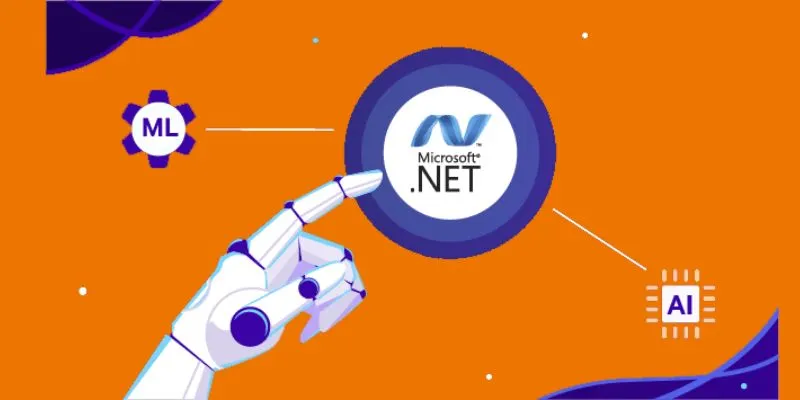
Artificial Intelligence (AI) is changing business across the globe, providing innovative solutions to complex problems and enhancing business operations. As AI technologies advance, developers need robust frameworks and platforms to build intelligent applications. .NET, Microsoft’s versatile and powerful framework, provides a strong foundation for integrating AI into applications. In this blog, we will explore how .NET supports AI development, focusing on its tools, libraries, and capabilities that enable the creation of sophisticated AI-driven solutions. Are you looking to advance your career in Dot Net? Get started today with the Dot Net Training in Chennai from FITA Academy!
AI Integration with .NET
.NET provides a variety of tools and modules for integrating AI into applications. The platform’s AI support includes machine learning, natural language processing, computer vision, and predictive analytics.
ML.NET: A Comprehensive Machine Learning Library
ML.NET is an machine learning toolkit created by Microsoft that enables.NET developers to create and incorporate bespoke machine learning models into their applications. It has a simple API and supports diversity of machine learning tasks such as classifications, regression, clustering, and recommendation.
- Ease of Use: ML.NET is designed to be accessible to developers with a .NET background, offering a straightforward API that integrates seamlessly with existing .NET applications.
- Customization: Developers can train models using their own data, enabling the creation of tailored solutions for specific business needs.
- Integration: ML.NET models can be easily incorporated into .NET applications, including web, desktop, and mobile apps, allowing for real-time predictions and analytics.
Azure Machine Learning: Scalable Cloud-Based Solutions
Azure Machine Learning is a cloud based platform that offers comprehensive tools for building, training, and deploying machine learning models. It integrates seamlessly with .NET, allowing developers to leverage its powerful features while using their preferred .NET environment.
- Scalability: Azure Machine Learning offers scalable compute resources, enabling developers to handle large datasets and complex models with ease.
- Experimentation: The platform supports experimentation with various machine learning algorithms and hyperparameters, facilitating model optimization and improvement.
- Deployment: Models trained on Azure Machine Learning can be deployed as web services or integrated into existing .NET applications, providing scalable and accessible AI solutions.
Cognitive Services: Pre-built AI Capabilities
Microsoft Azure Cognitive Services offers a set of pre-built AI services that can be seamlessly incorporated into.NET applications. These services offer ready-made solutions to popular AI tasks including picture identification, text analysis, and audio processing.
- Image and Video Analysis: Cognitive Services includes APIs for image and video analysis, allowing developers to incorporate features such as facial recognition, object detection, and content moderation.
- Natural Language Processing: The Text Analytics API provides capabilities for sentiment analysis, entity recognition, and language understanding, enabling sophisticated text processing and analysis.
- Speech Recognition: The Speech SDK offers speech-to-text and text-to-speech functionalities, making it possible to build voice-enabled applications and services. Learn all the Dot Net Development and Become a Dot Net Developer. Enroll in our Dot Net Online Course.
ONNX Runtime: Cross-Platform Model Inference
ONNX (Open Neural Network Exchange) Runtime is an open-source inference engine that supports models trained in various frameworks, including TensorFlow and PyTorch. It provides a high-performance runtime for running AI models across different platforms, including .NET.
- Compatibility: ONNX Runtime allows developers to leverage pre-trained models from different frameworks, integrating them into .NET applications with minimal effort.
- Performance: The runtime is optimized for performance, providing fast and efficient model inference on a variety of hardware, from CPUs to GPUs.
- Cross-Platform: ONNX Runtime supports multiple operating systems and devices, enabling the deployment of AI models in diverse environments.
Best Practices for AI Development with .NET
- Data Preparation and Preprocessing: Ensure that data used for training and inference is clean, relevant, and well-prepared to improve model performance and accuracy.
- Model Evaluation and Testing: Regularly evaluate and test machine learning models to evaluate their effectiveness and make necessary adjustments based on performance metrics.
- Security and Compliance: Execute security measures to protect sensitives data and ensure compliance with relevant regulations when handling AI and machine learning workloads.
- Continuous Learning: Stay updated with the latest improvements in AI and machine learning technologies to leverage new features and improve application capabilities.
.NET offers a powerful platform for integrating artificial intelligence into applications. With tools like ML.NET, Azure Machine Learning, Cognitive Services, and ONNX Runtime, developers can build, deploy, and scale AI solutions effectively. These resources enable .NET developers to enhance their applications with advanced AI capabilities, meeting the evolving needs of businesses and users. As AI technology progresses, .NET remains a key enabler for leveraging its full potential. Looking for a career in Dot Net Developer? Enroll in this professional Best Training Institute In Chennai and learn from experts about .NET Framework, Programming in C# and Implementing OOPS with C#.
Read more: Dot Net Interview Questions and Answers
